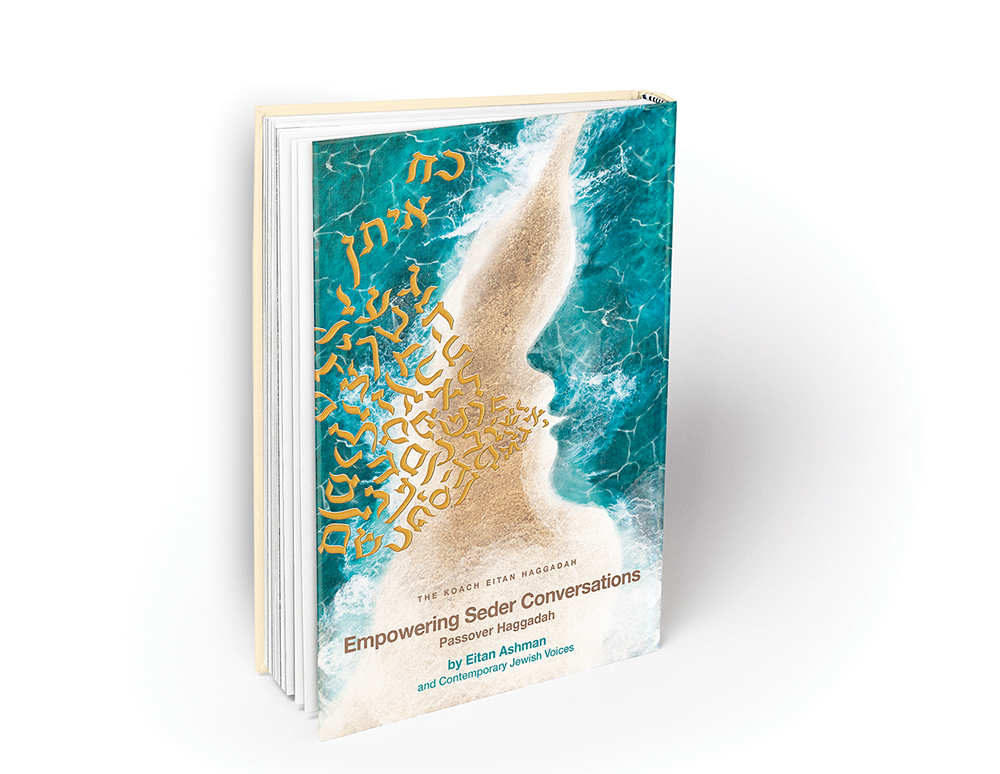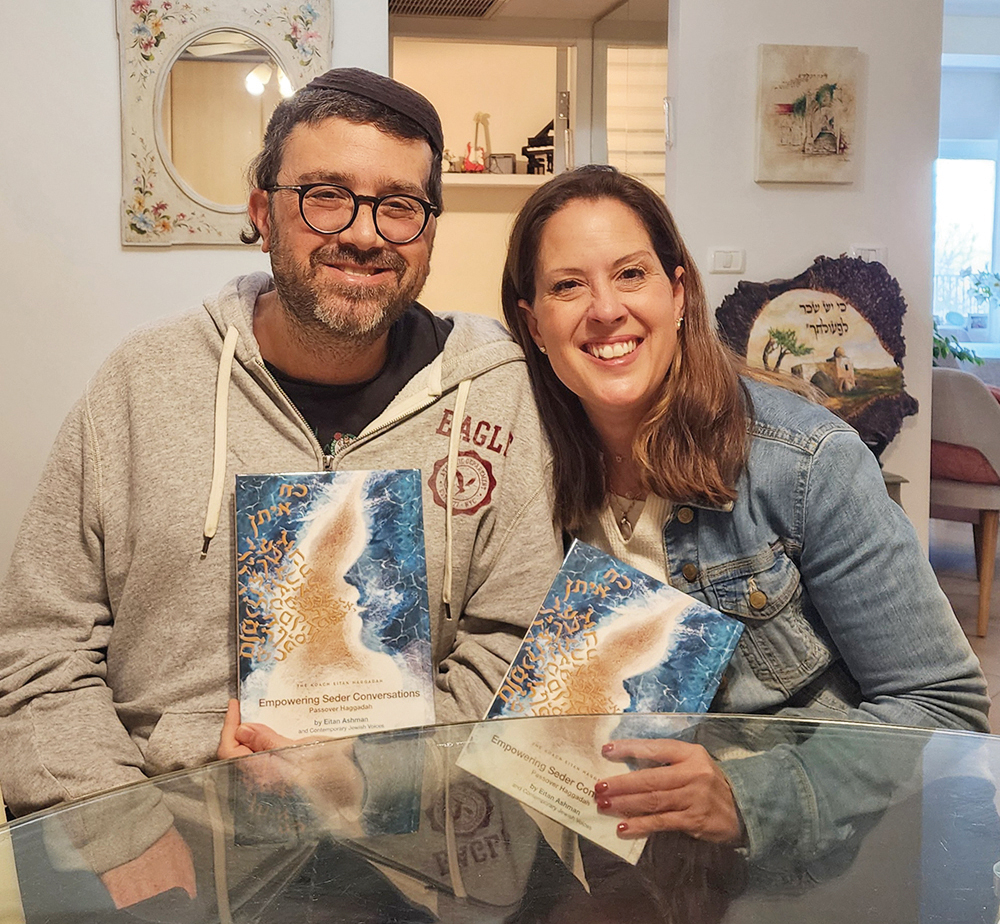
“Empowering Seder Conversations”
Passover Haggadah
One of the core commandments of the Passover holiday is the obligation of “v’higadata l’vincha,” or telling the story of exodus to your child. How does one who is incapable of speaking fulfill this biblical imperative? This is a question Efrat resident and father of four Eitan Ashman was forced to deal with after undergoing a massive stroke in 2017 at the age of 42 that resulted in aphasia. But together with his wife, Leora, and with the teachings of contemporary Jewish voices, Eitan produced a unique Haggadah that empowers individuals with communication disorders and language impairments to engage in the Seder experience, beyond the spoken word.
Before his stroke, the Baltimore native was an active participant in religious and communal life in Efrat. He participated in shiurim, taught classes and served as a volunteer medic. In addition to affecting his language center, the stroke damaged the right side of his body and caused severe memory loss and neuro-fatigue. He spent over three months in the hospital before beginning a lifelong journey of rehab. Unable to read out loud or fully get the words out of his mouth, Eitan was no longer able to participate in Jewish life the same way he could before the stroke. With his functioning cognition he was able to comprehend, but without the ability to communicate, he was left feeling lonely and frustrated.

According to the National Aphasia Association, aphasia affects the production or comprehension of speech and the ability to read or write. Between two and four million people in the United States alone live with aphasia. For an engaged member of the Jewish community, aphasia brings additional complications, since so much of Jewish ritual and observance is rooted in prayer, study and other activities that require communication. Lacking the ability to read or speak, people living with aphasia often find themselves on the sidelines of Jewish ritual and communal life.
Leora began writing posts on Facebook after Eitan’s stroke to offer a glimpse into Eitan’s condition and share practical tools people can take to foster inclusion and make Jewish communal life more accessible for people with aphasia. These posts grew into an organization they called Koach Eitan, or Eitan’s Force, founded three years ago. In addition to awareness campaigns and community projects, the organization provides support to families and caregivers to help them navigate the challenges of living with aphasia. According to its website, Koach Eitan strives “to create a world where no one feels alone in their journey.”
One of the organization’s major initiatives was the production of the Koach Eitan “Empowering Seder Conversations Passover Haggadah,” compiled by Eitan Ashman and edited by Leora Ashman, which was published by Urim Publications in 2024.
Leora explained that before Eitan’s stroke, her husband took on the nickname “Mr. Seder Man” due to his enthusiasm at Seder and his devotion to preparing teachings to engage his entire family in the experience. But the Seder became a major obstacle for Eitan, who would end up leaving the table early due to frustration and his inability to fully participate in the reading and telling of the Passover story. Inspired by Eitan’s desire to fully engage in the Seder experience, the husband and wife duo set out to design a Haggadah that would foster a more accessible and meaningful Seder experience for people living with aphasia.
The Haggadah features an inclusion guide with practical tools for how to create a Seder experience that is adaptive to the needs and abilities of all participants, as well as how to communicate with individuals who have aphasia. The Haggadah is lined with short commentaries from dozens of thought leaders and rabbinic figures, including Rabbanit Shani Taragin, Rabbi Shlomo Riskin, Sivan Rahav-Meir and many others, which enhance the text of the Haggadah through succinct and simple ideas. Many of the teachings focus on themes of resilience and overcoming hardship to live a life of freedom. The book offers alternative options for people who are unable to read, such as acting prompts and partner reading. It also features many icons in place of heavy text. A Hebrew edition of the Haggadah is expected to be released next year.
According to Leora, who is also the editor of the Haggadah, the book has been “life-changing” to her family’s Seder experience. “Eitan feels like a part of the Seder and is excited to come to the Seder,” she said. “That’s what Seder is about. It’s about family, it’s about sharing. It’s about everybody coming together. And when one of you is missing, that sort of deflates the entire night.”
The Haggadah opens with a forward by Rabbi Johnny Solomon, who has served as a spiritual mentor for the Ashman family. He explained that the sages commanded us with an obligation to help those who long to engage in the Seder experience but lack the words to do so. This Haggadah, he explained, is the fulfillment of this command.
Indeed, over 2,000 copies of the Haggadah have already been sold. In addition to people living with aphasia, it has been used by people with dyslexia, individuals who don’t like speaking in public, and those with a variety of speech disorders.
What is Leora most looking forward to this Passover? “I am looking forward to Eitan being Mr. Seder Man again,” she said. “It’s an amazing feeling to see the family as a family.”
To order a copy of the Haggadah visit www.urimpublications.com/empowering-seder-conversations-passover-haggadah.html.
after Eitan’s stroke I began the Facebook page and posts- 3 years ago we founded the organization
Alisa Bodner is a Fair Lawn native who immigrated to Israel over a decade ago. She is a nonprofit management professional who enjoys writing in her free time.









